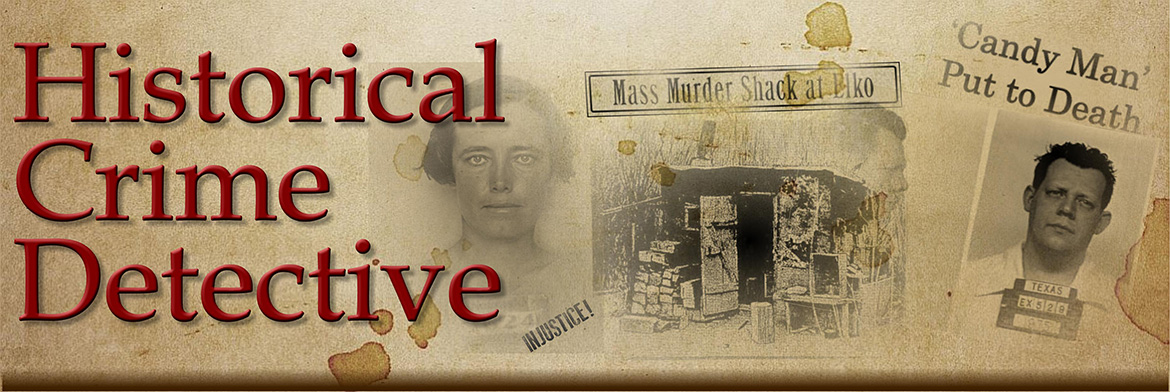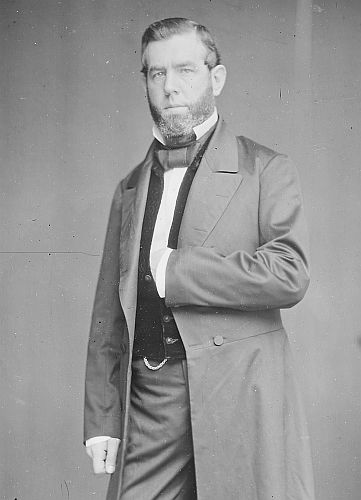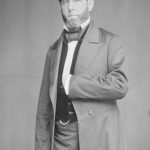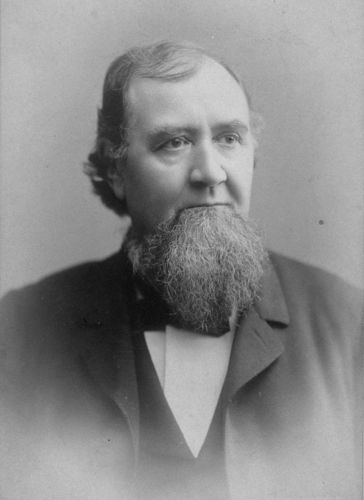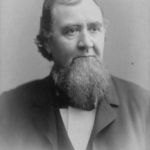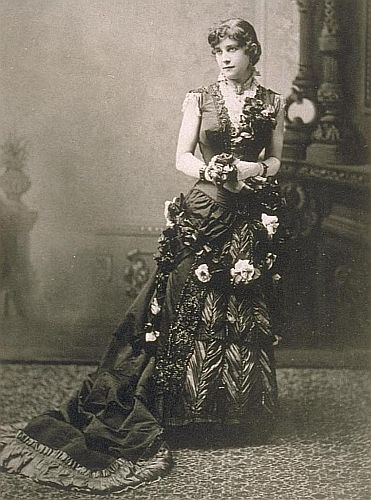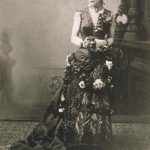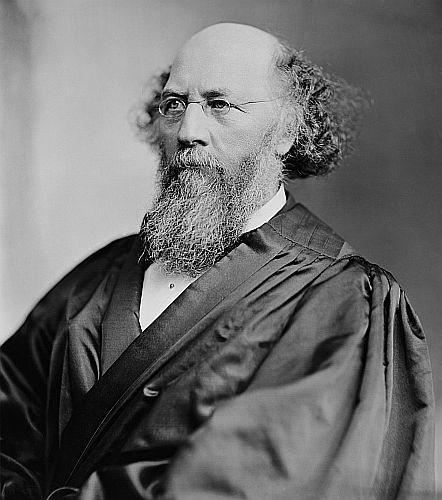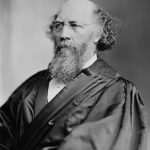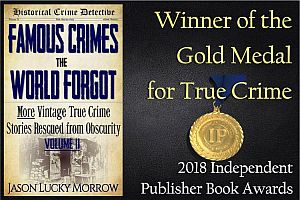The Duel between Sen. Broderick and Judge Terry, and the death of Terry by Supreme Court Justice Stephen Field’s bodyguard.
The Strenuous Lives of Senator Broderick and Judge Terry and Their Famous Duel
Story by Thomas Duke, 1910
“Celebrated Criminal Cases of America”
Part I: San Francisco Cases
Part One
David C. Broderick was born in the District of Columbia on February 4, 1820, and as a boy worked with his father as a stonecutter on the United States Capitol building. He afterwards joined the New York Volunteer Fire Department and conducted a saloon; at the same time becoming a politician. He left for San Francisco, arriving on June 13, 1849. He was a leader in organizing the volunteer fire department here, “Broderick No. 1” being the name given one of the fire companies in his honor.
On January 8, 1850, Broderick was elected a State Senator and was subsequently elected president of the Senate. He innocently made a false accusation against ex-Governor Smith of Virginia, which caused the latter’s son, Judge Caleb Smith, to challenge him to fight a duel. The challenge was accepted and the duel occurred on March 17, 1852, near Oakland Point. No injuries were inflicted but Smith’s bullet struck Broderick’s watch. Broderick subsequently apologized before the Senate for his offensive remarks.
After a long and bitter fight, lasting for years, Broderick was elected United States Senator on January 9, 1857.
David S. Terry was born in Todd County, Kentucky, on March 8, 1823. He came from a family of warriors, his grandfather commanding a regiment during the Revolution. His older brother was killed while commanding a regiment of Confederates, and his youngest brother, a prominent Southern attorney, while not actually participating in that war, asked for and was granted permission to witness the battle of Shiloh and was killed the first day.
Terry’s father contracted habits which forced his wife to procure a divorce, and in 1833 she moved to Texas with her children, where she purchased a large cotton plantation. In 1836 Mrs. Terry died, and in the same year, David, then in his thirteenth year, participated in the battle of San Jacinto, and on the achievement of Texan independence returned to his home.
In 1841 he began studying law and in 1843 was admitted to the bar, shortly afterward opening an office in Galveston, Texas. In 1846, when the war between the United States and Mexico was inaugurated, he enlisted as a lieutenant.
In December, 1849, Terry came to California, and after mining in Calaveras County for a few months, he began the practice of law in Stockton. Shortly after this he was induced to accept the nomination for Mayor of Stockton on the Whig ticket, but he was defeated by Samuel Purdy.
In September, 1855, Terry was the Know-Nothing Party’s candidate for Chief Justice of the State Supreme Court. He was elected and took office the next month.
On June 20, 1856, he was arrested by the Vigilance Committee for stabbing Officer Hopkins, and was held in custody until August 7. (See history of Vigilance Committee.) During Terry’s incarceration Broderick did all in his power to assist him and they were close friends.
When the Lecompton convention was held in 1859, Broderick was in control and Terry sought to be renominated, but it was decided by Broderick that it would not be good policy to give him the nomination. This caused Terry to deliver a speech in Sacramento in June, 1859, in which he stated that the convention which refused to nominate him was owned by a man whom they were ashamed to acknowledge as their master.
Two days afterward Broderick was seated at the breakfast table in the International Hotel in San Francisco, and on reading this speech called the attention of D.W. Perley, a former law partner of Terry’s, to its contents. Broderick then referred to Terry as a “damned miserable ingrate” for failing to appreciate what he (Broderick) had done for him while he was in the custody of the Vigilantes. He further stated that he had changed his mind in regard to Terry’s honesty.
Perley took the matter personally and challenged Broderick to fight a duel, but Broderick declined to accept the challenge because he was about to enter into a bitter political campaign, and for the further reason that Perley did not occupy an equally elevated or responsible position. But he added that when the campaign was concluded he would be prepared to answer for any statement made by him.
Terry, learning of this significant statement, decided to wait until after the election, which occurred on September 7 and resulted in the defeat of Broderick by U. S. Senator William T. Guinn, who had the distinction of being one of the two first United States Senators from California in 1850, John C. Fremont being his colleague. Terry then addressed the following letter to Broderick :
Oakland, September 8, 1859
Hon. D. C. Broderick—Sir : Some two months since, at the public table of the International Hotel, in San Francisco, you saw fit to indulge in certain remarks concerning me, which were offensive in their nature. Before I had heard of the circumstance, your note of 20th of June, addressed to Mr. D. W. Perley, in which you declared that you would not respond to any call of a personal character during the political canvass just concluded, had been published.
I have, therefore, not been permitted to take any notice of those remarks until the expiration of the limit fixed by yourself. I now take the earliest opportunity to require of you a retraction of those remarks. This note will be handed to you by my friend, Calhoun Benham, Esq., who is acquainted with its contents, and will receive your reply.
S. TERRY.
Broderick requested Terry to designate what remarks were considered offensive. Terry did so and the Senator replied that he had made the statements attributed to him and that it was for him (Terry) to judge whether they afforded good grounds for offense.
Terry then stated that he was left no alternative but to demand the satisfaction usual among gentlemen, and appointed Calhoun Benham, former district attorney in San Francisco, to arrange the details. Terry then resigned as Chief Justice of the Supreme Court.
The seconds met, decided that pistols should be the weapons used, and that the time and place of the meeting would be at sunrise, September 11, 1859, near Lake Merced, San Mateo County.
Captain of Detectives I. W. Lees and Detective H. H. Ellis procured warrants for their arrest from Judge Coon and followed the carriages to the dueling ground. When the distance had been measured off and Terry and Broderick were handed their weapons, they were placed under arrest, but the cases were dismissed by Judge Coon the next day.
On the following morning, September 13, 1859, they met again near the same place. It was agreed that the combatants should fire at the count of three, but at the count of one Broderick accidentally discharged his pistol, the ball striking the ground nine feet from him, but in the direction of Terry. Just at the count of “two” Terry fired, the ball striking Broderick in the chest. His frame trembled like a ship that had struck a rock. He gradually released his hold on his weapon, and after a heavy convulsion, sank to the ground. The gigantic Terry stood like a statue with his arms folded, closely watching Broderick.
When the condition of Broderick was announced, Terry left the field with his seconds, ex-District Attorney Calhoun Benham and Thomas Hayes, after whom “Hayes Valley” was named, and they proceeded to Terry’s home near Stockton.
On the September 16 Broderick died, and Lees and Ellis procured warrants for Terry’s arrest. Mr. Ellis, who subsequently served as Chief of Police, related to the author his experience in attempting to serve the warrant, in the following language:
“Lees and I procured a warrant against Terry and had it properly endorsed. We then proceeded to Terry’s home. When we arrived within about one hundred feet of the house, a window was thrown open and Calhoun Benham, Tom Hayes, Sheriff O’Neill and Terry leveled shotguns at us and told us to ‘halt.’
“We did so and announced that we were officers with a warrant for Terry. He stated that he was certain that he would not receive a fair trial and feared violence at that time, but agreed to surrender three days afterwards at Oakland. Knowing that he would keep his word in this, as we also knew he would do when he told us that if we came nearer to his house they would all shoot, we decided to allow him to dictate terms. He surrendered as per agreement, and the case was heard by Judge James Hardy in Marin County, a change of venue having been granted because of the alleged prejudice against Terry in San Francisco. This case was dismissed but Terry was subsequently indicted by the Grand Jury in San Mateo County. The point was then raised that he had been once in jeopardy, and being well taken, that case was also dismissed.”
After his acquittal Terry was practically ostracized. He went to the mines in Virginia City, but in 1862 returned to Stockton, where he resumed the practice of law. In 1863 he joined the Confederate Army as a Colonel. He rose to the rank of Brigadier-General and was placed in command of a brigade from Texas.
Disgruntled at the outcome of the Rebellion he returned to Texas and engaged in the wool and cotton industries, but failing in this, he again returned to Stockton, where he resumed the practice of law.
In 1878 he was elected a delegate to the convention to revise the State Constitution, and in 1880 he was selected as a presidential elector on the Democratic ticket.
Part Two
Judge Terry’s wife died on December 24, 1884.
Sarah Althea Hill was born in Missouri in 1848. In 1854 her parents died, leaving her and her brother Morgan an estate valued at $40,000. Sarah received a good education and developed into a beautiful young woman.
In 1870 she came to California with her uncle, who provided her with a suite of rooms in the Palace Hotel. Here she met the owner of the hotel, United States Senator William Sharon, from Nevada, a multi-millionaire.
In 1883 Sarah Althea produced a document claiming that it was a marriage contract entered into between Sharon and herself on August 25, 1880. On October 3 Sharon began proceedings to have the marriage contract, alleged to have been entered into by Miss Hill and himself, declared null and void. A long and bitter fight ensued, at the outset of which Miss Hill was represented by Attorney W. B. Tyler.
On August 3, 1885, S. C. Houghton, acting as Examiner in Chancery of the United States Circuit Court, had a witness named R.U. Piper on the witness stand undergoing examination in reference to this case. At this hearing William M. Stewart was representing the Sharon interests. While Piper was testifying, Miss Hill became enraged at Attorney Stewart and cried out: “I feel like taking that man Stewart out and cow-hiding him. I will shoot him yet; that very man sitting there.”
The Master in Chancery attempted to pacify her and succeeded for the moment, but shortly afterward she opened a satchel and drawing out a revolver, pointed it at Judge O.P. Evans, also of opposing counsel. He remained cool and asked her if she wanted to shoot anybody.
She replied: “I am not going to shoot you now unless you would like to be shot and think you deserve it.” He assured her that he had no desire to undergo any such experience, and after considerable persuasion she handed the revolver to the Master in Chancery and the examination immediately adjourned.
On August 5 this incident was reported to Judges Field and Sawyer, who were then Judges of the United States Circuit Court, but no action was taken, other than the issuance of an order that the Marshal of the Court should take all such measures as might be deemed necessary to keep the defendant disarmed and under strict surveillance while attending the examination.
Judge Terry finally took charge of Miss Hill’s case, but on the death of Senator Sharon at the Palace Hotel on November 14, 1885, a new fight began for the estate. On January 7, 1886, Judge Terry married his fair client.
The fight for the estate was continued until September 24, 1888, when Stephen Field, who at this time was a Justice of the United States Supreme Court, rendered a decision against the Terrys. At this point Mrs. Terry jumped up and cried out to the Justice: “How much money did you get for that decision?” The Court ordered United States Marshal Franks to put her out of the courtroom, whereupon Terry sprang to his feet and dared any one to lay a hand on his wife. The Marshal ignored Terry’s remark and forcibly ejected Mrs. Terry. Her husband then drew a Bowie knife and attempted to follow Franks, but was overpowered.
As a result of this outbreak, Terry was found guilty of contempt of court and was sentenced to six months’ imprisonment in the Alameda County Jail and his wife was sentenced to thirty days’ imprisonment.
While in jail Terry swore he would have revenge, and as a result David Neagle was appointed Deputy United States Marshal and assigned as bodyguard to Justice Field. Neagle was born and raised in San Francisco, where he took an active part in politics. He afterward went to Tombstone, Arizona, where he served as City Marshal. One day, one of Neagle’s officers was shot by a Mexican desperado, who then rode away to the hills. Neagle pursued him, and the next day came into town on horseback with the Mexican’s body thrown over the saddle in front of him. He then went to Butte, Montana, but returned to San Francisco in 1883. He was employed in the Tax Collector’s office when appointed to guard Justice Field, whom he accompanied to Los Angeles.
On August 13, 1889, the court adjourned in Los Angeles, and Field and Neagle started for San Francisco. On reaching Fresno, Terry and his wife boarded the same train, but did not see Justice Field then.
At 8:15 a. m., August 14, the train arrived at Lathrop and stopped to allow the passengers to partake of breakfast in the dining-room in the depot. Justice Field and Neagle preceded Terry and his wife to the dining-room. Immediately after Judge Terry and his wife took their seats, Mrs. Terry observed Justice Field, and, after informing her husband of his presence, she arose and left the dining-room hurriedly.
W. Stackpole, who conducted the dining-room, recognized his guests, and being familiar with their past differences, and feeling somewhat uneasy at Mrs. Terry’s actions, he approached her husband and asked if she contemplated doing anything rash. Terry gave an evasive answer, and im-mediately arose, walked over to Justice Field, and slapped his face. Neagle jumped to his feet with his revolver drawn, and, as Terry was about to continue the assault, Neagle placed the revolver to Terry’s chest and fired. The latter sank to the floor and died instantly.
His wife heard the shot, and rushed to the dining-room with an open satchel in her hand. She was stopped by Stackpole, who removed a revolver from the satchel. Mrs. Terry then became hysterical and cried for vengeance.
Field and Neagle returned to their stateroom, where they were joined by Constable Walker, who placed Neagle under arrest and took him to the jail in Stockton.
Justice Field was arrested on August 16 in San Francisco on a warrant sworn to by Mrs. Terry, charging him with complicity in the “murder.”
The case against Justice Field was dismissed in the Circuit Court on August 27, 1889. He presented Neagle with a gold watch and chain as a token of his appreciation for services rendered.
Neagle’s case was finally dismissed in the United States Circuit Court on September 16, 1889, where it was taken on a writ of habeas corpus.
Since his acquittal, Neagle has acted as a bodyguard for different prominent men in San Francisco.
Mrs. Terry became a physical and mental wreck after the death of her husband, and on March 10, 1892, she was committed to the Stockton Insane Asylum.
—###—
